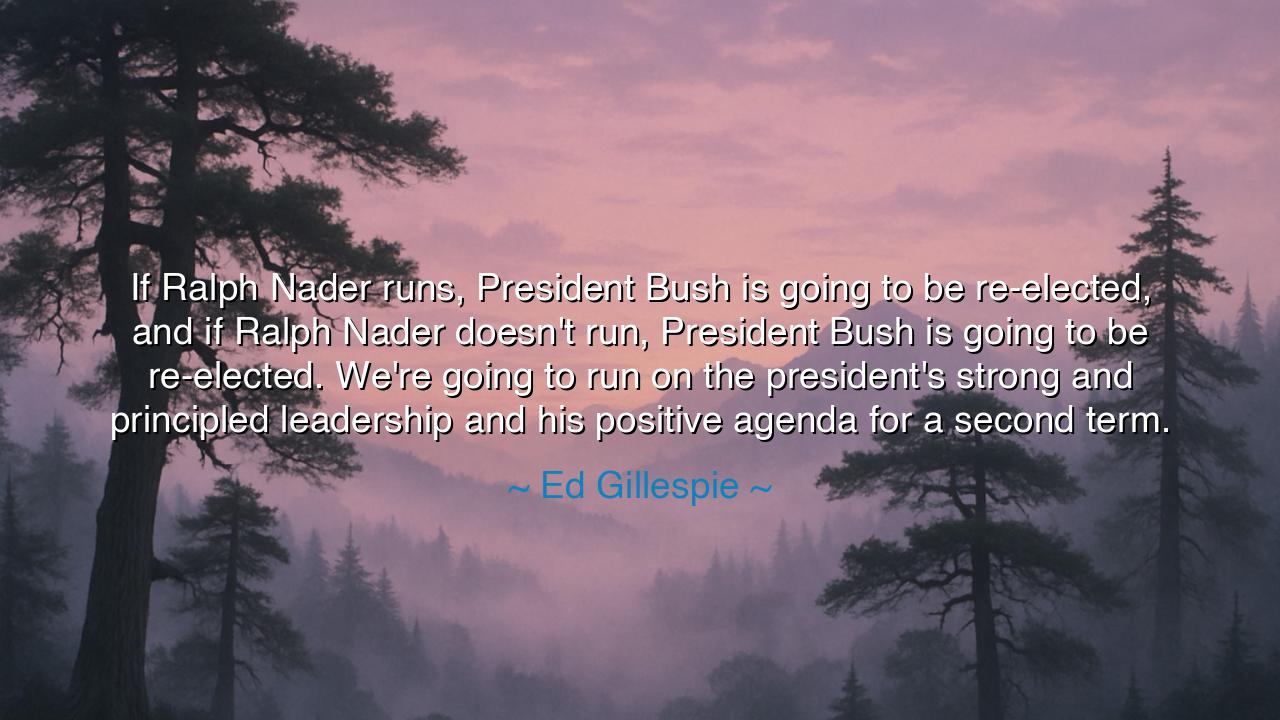
If Ralph Nader runs, President Bush is going to be re-elected
If Ralph Nader runs, President Bush is going to be re-elected, and if Ralph Nader doesn't run, President Bush is going to be re-elected. We're going to run on the president's strong and principled leadership and his positive agenda for a second term.






When Ed Gillespie declared, “If Ralph Nader runs, President Bush is going to be re-elected, and if Ralph Nader doesn’t run, President Bush is going to be re-elected. We’re going to run on the president’s strong and principled leadership and his positive agenda for a second term,” he spoke not merely of politics but of the timeless struggle for power, vision, and destiny. His words reveal a confidence rooted not in chance or circumstance, but in the belief that true strength lies in leadership and the unwavering proclamation of purpose.
The ancients would have recognized this tone well. For the Romans, it was not the shifting winds of rivals or minor challengers that determined the fate of Caesar, but the perception of his principled leadership. When the people believe a ruler is steady, strong, and endowed with destiny, even the noise of opponents cannot overturn the course of empire. Gillespie’s words echo this same conviction: that the positive agenda of one leader outweighs the uncertainty of another’s ambition.
Yet beneath his confidence lies a lesson in political strategy. He points to Nader, a man whose candidacy in the year 2000 altered the balance of the election, siphoning votes that might have gone elsewhere. By 2004, Gillespie, as strategist, reframed the stage: whether Nader runs or does not, the outcome remains unchanged, for the strength of Bush’s leadership is painted as inevitable. This is not only prediction but a declaration, a way of shaping reality through words spoken boldly.
History offers us parallel tales. Consider the campaigns of Pericles in Athens, who with eloquence and vision convinced his city to follow him, not because challengers were absent, but because his aura of certainty disarmed them. Or think of Lincoln, who in the midst of war proclaimed with steady voice that the Union would prevail—not merely as hope, but as inevitability. In both, as in Gillespie’s words, confidence became prophecy, and prophecy became history.
Thus, let this truth be carried forward: rivals and challengers may appear, but the heart of victory lies in the faith of the people in their leader’s principled strength. To proclaim certainty is to bend the course of destiny, and to walk with the assurance of triumph is to inspire triumph itself. For when vision is positive, when leadership is unwavering, then even the storms of opposition break like waves against an unshakable rock.






TTAn Nguyen Thi thuy
Ed Gillespie’s focus on President Bush’s strong leadership and agenda seems to emphasize traditional political messaging. But what happens when voters no longer believe in the effectiveness of such leadership? How much does this comment reflect the political climate at the time, where party loyalty and polarization could overshadow individual candidate platforms? Could the focus on a single candidate’s leadership ultimately prevent the necessary shift in addressing voters' broader concerns?
PDDang Phuc Duong
Gillespie’s remark suggests a deterministic view of the election, where President Bush’s re-election seems inevitable regardless of other factors, such as Nader’s candidacy. Does this reflect the political establishment’s control over the electoral process, or is it a sign of their strategic confidence? How does this mindset affect voter enthusiasm—do people feel their votes truly matter, or do they feel trapped by a system that offers limited choices?
CHCuong Hung
This statement by Ed Gillespie raises an interesting point about political strategy and the role of third-party candidates. Is it possible for a third-party run to influence the general election, or is the outcome already determined by the main party candidates? Gillespie’s confidence in President Bush’s re-election suggests a belief in the president’s strong leadership, but does this overlook the nuanced concerns of voters who may feel disconnected from the major parties?
DQHa Diem Quynh
Ed Gillespie's comment seems to downplay the role of third-party candidates, like Ralph Nader, in the electoral process. But how valid is the assumption that Nader’s candidacy would lead to Bush’s re-election? What does it say about how the public perceives third-party candidates—are they seen as spoilers, or are they important voices that challenge the status quo? Does this statement reflect a lack of faith in electoral diversity?
GDGold D.dragon
The notion that Ralph Nader’s run wouldn’t affect President Bush’s re-election outcome seems to imply that third-party candidates have little impact in a polarized political system. But how much power do third-party candidates really have in shaping elections? Is this statement a critique of the limited choices voters face, or is it an acknowledgment of the stronghold the two major parties have in the American political landscape?